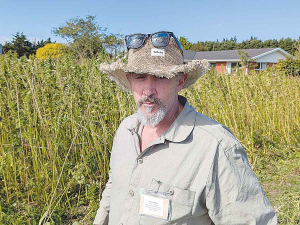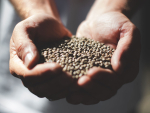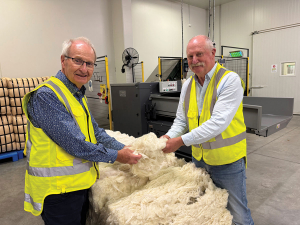The visit followed the announcement by the Minister for Regulation, David Seymour, that the "outdated and burdensome" regulations surrounding industrial hemp would be reviewed.
Five MPs, officials from the Ministry of Health and Ministry for Primary Industries, and various industry stakeholders visited the Rubisco hemp fibre extraction plant in Christchurch, the Hemp NZ factory at Ashburton (which extracts food ingredients and oil from hemp seeds), and a nearby farm now in its fifth year of growing industrial hemp.
Hosted by the New Zealand Hemp Industries Association (NZHIA), the visit aimed to highlight the potential for full-plant utilisation of industrial hemp including fibre for textiles and construction materials, nutrition, and health and wellness.
NZHIA chair Richard Barge said Seymour's announcement followed some "great conversations" with MPs and a presentation to the primary production select committee at the end of last year. "So, they know where we're coming from - we want to be a fully enabled industry."
At present, growing hemp must be licenced under the Misuse of Drugs regulations of 2006, despite industrial hemp containing no THC.
Barge said the review was overdue.
"It gives us an opportunity to really talk to the politicians and cabinet over the implications of what they're considering.
"If they wanted to, they could make some minor changes and not much would change, but if they wanted to really remove uncertainty and let this industry develop, they can pull some levers, that could really make it happen and it can happen very, very fast."
'A Wonderful Product'
Paul Leadley, who farms at Wakanui about 10km out of Ashburton, has grown hemp for five years and called it "a wonderful product".
Growing it under contract to Carrfields, the majority shareholder of the Rubisco plant, he said he was attracted to it because he is "not a machinery guy" and, as with the process vegetables he grows for Talley's and maize for the Five-Star Beef feedlot, he doesn't need his own harvesting machinery.
However, there was room for improved breeding, since the variety he is currently growing was bred in 1966. "I would never dream to grow a maize crop or a wheat crop that had the genetics of the 1960s."
But Leadley adds that hemp is one of his more environmentally friendly crops.
"It doesn't get any spray at all, doesn't use a lot of fertiliser. It's got quite a good deep root system.
"The paddocks seem to be in quite good nick after them. It seems to be relatively restorative to the ground.
"And it uses a lot less water than cotton and things like that."
He is currently growing a large field of a fibre variety which will soon be harvested not for its own fibre but to harvest the seed for further plantings.
"We're deliberately kept this short, because if we treated it properly, it would be seven, eight foot tall," he said.
"And there's a fine line between killing it and keeping it short. So it hasn't been babied. Because it has to be short to just physically get a combine through it."
Travis Ryan-Salter, who is Rubisco's chief technical officer and agritech specialist for Carrfields, said bird control was a huge challenge with hemp because of its high nutrition value, especially now the barley has finished.
"Once they get a taste for it, they just love it."
Because it was a roadside paddock, Leadley's crop was growing behind a maize border to hide it from public view.
"This is probably one of the more contentious issues of hemp," said Ryan-Salter.
"It's still reasonably regulated and people don't want to be able to see it from the road.
"But the reality of it is, around here people have seen enough hemp crops so it's not that interesting anymore."
Because the management of hemp and maize are so different, the maize is low quality and not useful for much else, making the border largely a waste of space.
One of the challenges of hemp was a tendency to "sulk" and not recover from early setbacks, as shown in a band of smaller plants in Leadley's crop lying between two irrigators.
"That's where there's not as much water in the overlap. That has been there completely from the start - one watering at the start when it was two weeks old, and you can see that effect all through the crop's life," said Ryan-Salter.
"That's why establishment is absolutely critical."
Meanwhile, the HempNZ company, which extracts oil and nutrients from hemp seed, has recently established a new facility at Ashburton.
Business development manager Nigel Hosking said Canterbury was the "cereal bowl" of the country and 90% of hemp grain is grown within about 50km of Ashburton.
But it was being transported to the North Island for processing.
"Economics thell you that's probably not the best to do; bring it back to where the infrastructure is and it's here."











